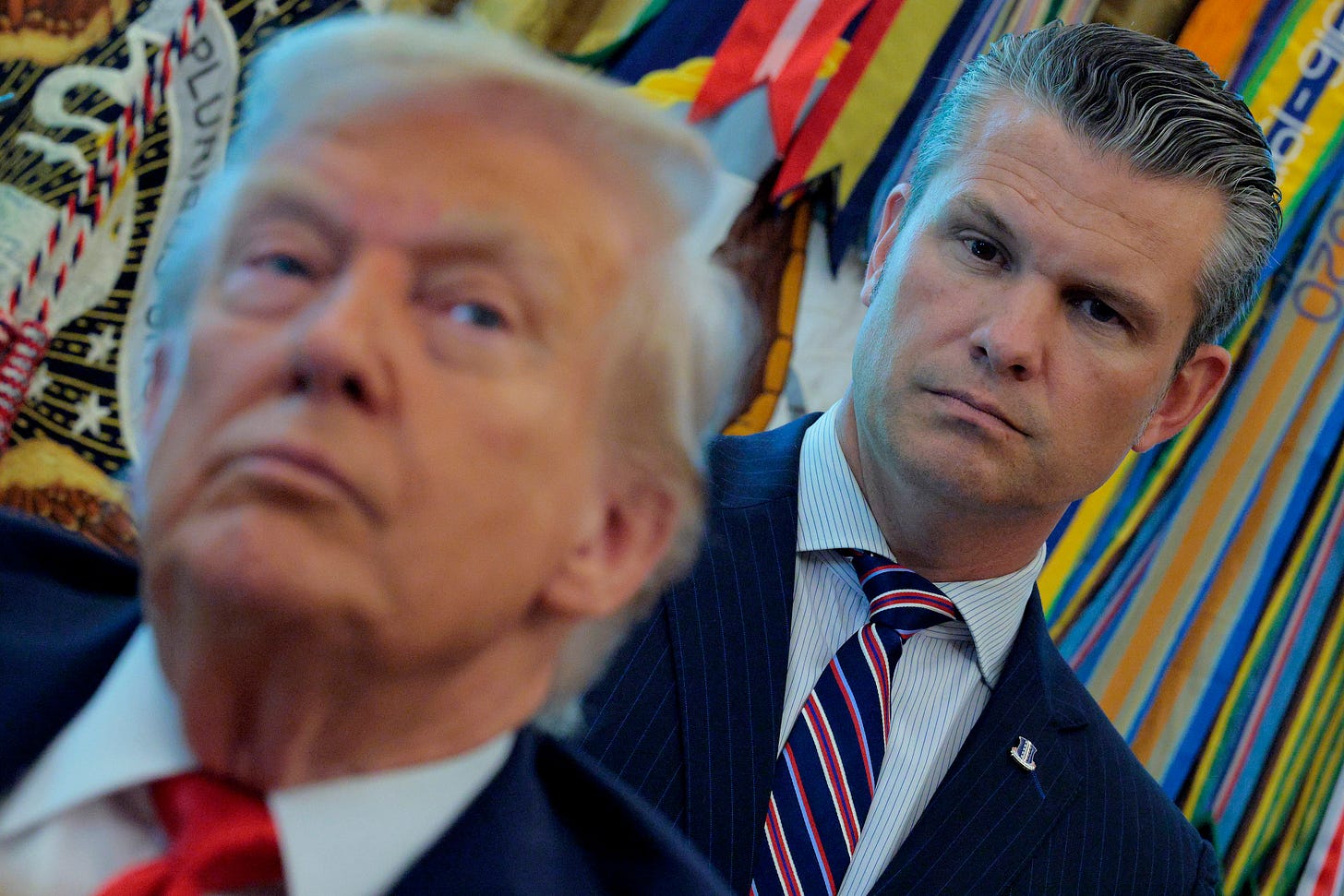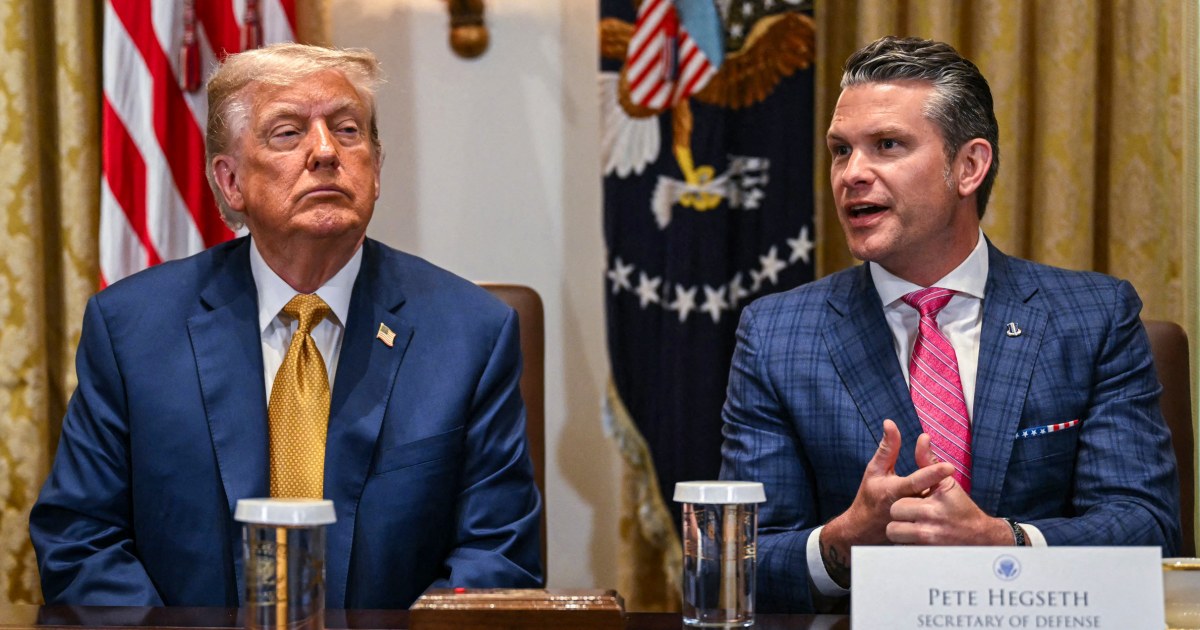
ONE OF THE MOST CRITICAL ATTRIBUTES of any senior military leader is the ability to adapt. In combat, conditions change by the hour. The fog of war, the unexpected actions of an enemy, or the friction of weather, terrain, and myriad human factors all demand leaders who can adjust without losing sight of their mission and their values. The best generals and admirals know this because they’ve practiced it for years, and they have spent their careers either adapting or preparing to adapt—not only on the battlefield but in every professional setting.
That ability has been tested the last several days, as hundreds of flag officers—generals and admirals serving around the globe—have been ordered, along with their senior enlisted advisors, to travel from their duty stations to Quantico to hear tomorrow from Secretary of Defense Pete Hegseth, and now, it was announced on Sunday, from President Donald Trump himself.
How have they adapted? Well, at first, Tuesday’s gathering was billed as a seminar delivered by Secretary Hegseth on his views regarding the “warrior ethos,” a phrase he frequently invokes. But the officers and senior enlisted personnel who will gather in that room are already deeply familiar with that subject. The military ethos is not a slogan. It is a part of the professional culture built on four enduring elements: the oath to the Constitution, the various services’ values and creeds, and the four elements of the warrior ethos. Every officer and each enlisted person learns these norms from basic training or their first days at a service academy. Together, these elements are the base that reinforce the idea that service members fight not for party or president, but for the nation and its people, their units and their comrades.
Later, anonymous voices from within the Pentagon described Hegseth’s real plans for this one-hour session in more grandiose terms: “It’s about getting the horses into the stable and whipping them into shape.” He reportedly wanted to read them what he expected of them, as though the warrior ethos were a groundbreaking innovation rather than the strength of the American military. That phrase—taking them to the stables—is more befitting a cowboy movie than a national security meeting, and it truthfully sparked unease among those who have actually led soldiers into combat over the last twenty years.
It appears that when the event increasingly became a lightning rod over its staggering costs, the security risks of gathering every senior commander in one place, and the disruption to ongoing missions worldwide, the White House escalated it on Sunday. The president decided he too must speak to “his” generals. (I leave it to others to speculate whether having Trump address this audience was the plan all along.)
I’ve watched President Trump address military audiences in the past. At the West Point graduation of the Class of 2025, cadets were reminded before the ceremony that they must remember their professional responsibilities while the president addressed them: remain disciplined, show no political bias, watch body language and facial expressions during the speech. I was seated facing the graduates, and they did exactly as I would expect them to do as new lieutenants. Even as the president veered into insulting the policies of past administrations, mocking former President Biden, and boasting about a rich friend’s “trophy wife,” the cadets kept their composure. Freshly commissioned second lieutenants, on the brink of careers of service, knew their duty was to project professionalism no matter what swirled around them. They showed they could adapt.
The cadets were likely reminded to uphold their professional standards because of what Americans had seen a few weeks earlier. At Fort Bragg, Trump spoke to a carefully selected crowd of supportive young soldiers corralled into a televised backdrop. Their cheering and hooting, while wearing a uniform, violated both the professional creed and the Uniform Code of Military Justice. It was a troubling scene: indiscipline wrapped in partisan theater. Their actions harmed the reputation of the Army.
This Tuesday’s audience will be different. These are not impressionable cadets or supporting soldiers who volunteer to be a backdrop. These are generals and admirals who have led troops into battle, commanded multinational alliances, and spent their professional careers steeped in the apolitical traditions of military service.
I know many of these men and women. They are not an easy crowd to play to. Per protocol, they will be called to attention when the secretary and the president enter the auditorium, and they will assume that position again when their superiors leave. They will offer polite applause, but nothing more. Just like the Chiefs of Staff at the State of the Union address, they will not cheer for politics. That’s because they serve the Constitution. Their silence is not weakness—it is discipline, the kind of discipline that has carried them through war and loss. I believe they will maintain that silence and their poker faces; that is what I would do if in the audience. And those actions will speak volumes.
If the president tries the same kind of speech he gave last week at the United Nations—veering into self-congratulation, derision of allies, and ridicule of adversaries in ways that play to a domestic political audience—the alarm inside that room will likely grow more palpable. These officers have sat across from NATO counterparts, briefed coalition partners in the Indo-Pacific, and negotiated with allies whose trust in America is essential. They will hear such rhetoric not as showmanship but as recklessness.
What should Americans prepare to see when they watch this event? I hope it is our senior officers showing they know how to adapt to any environment, even this one, by falling back on the real ethos and values that guides their every action. I hope they will not become props or pawns. And I hope the loudest message they send is no message at all—only that they have the quiet, disciplined silence of professionals who know their oath is to the Constitution, not to a man.
Source link
